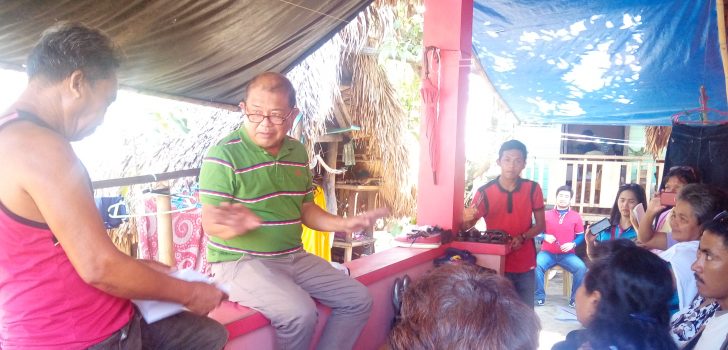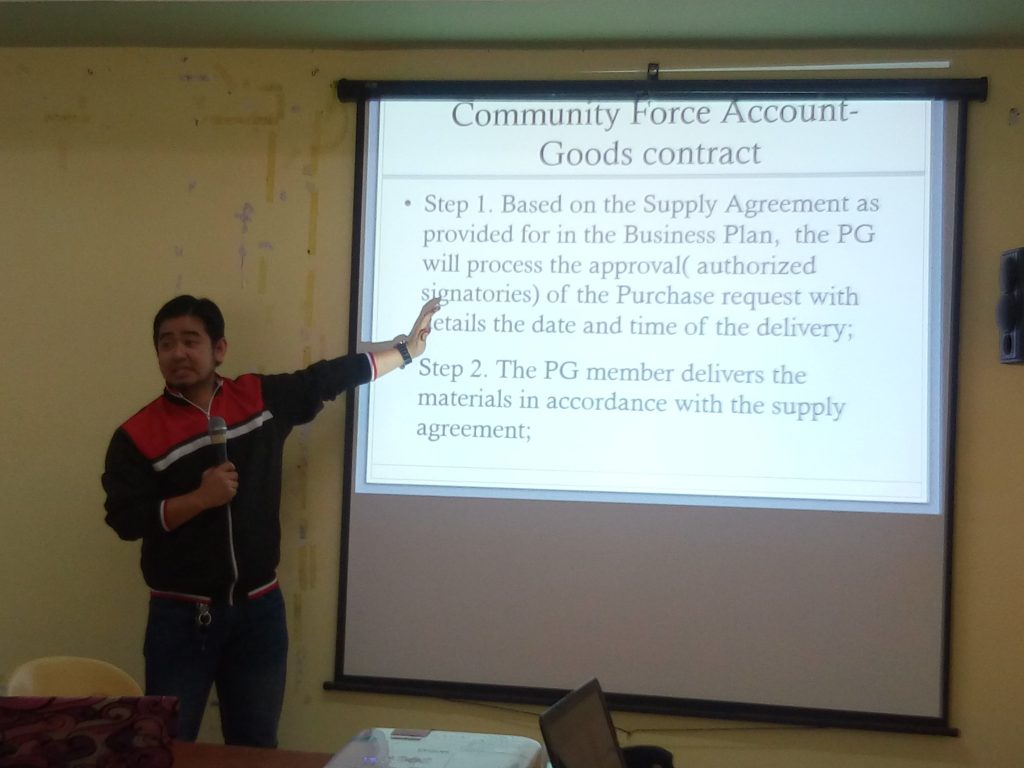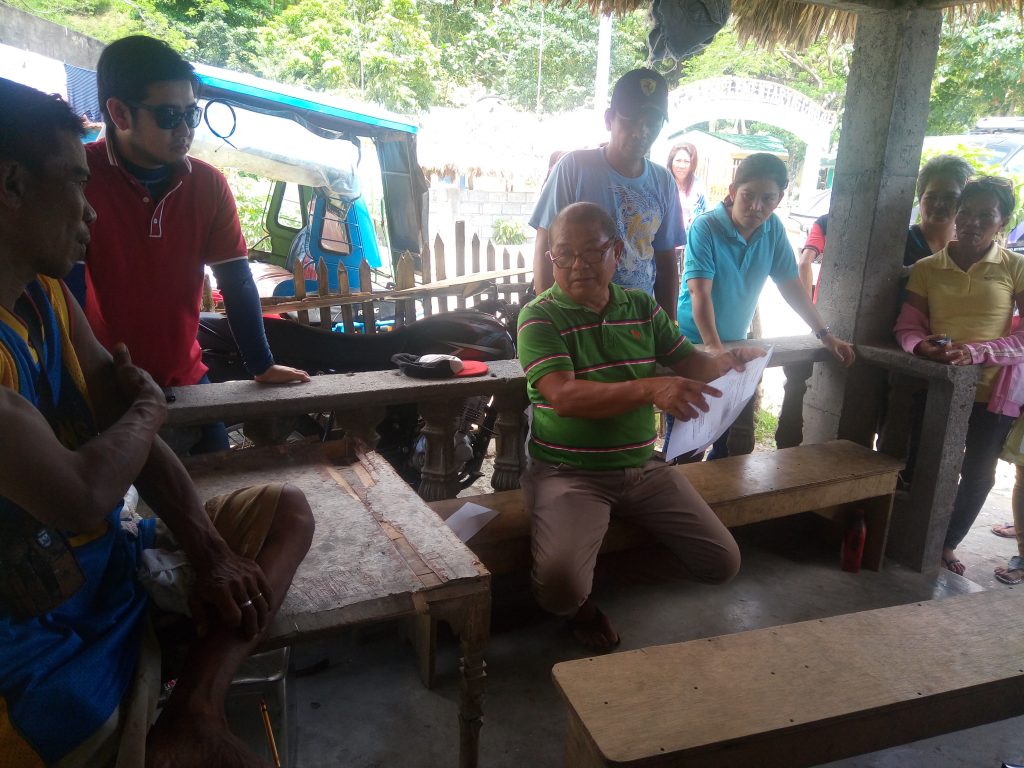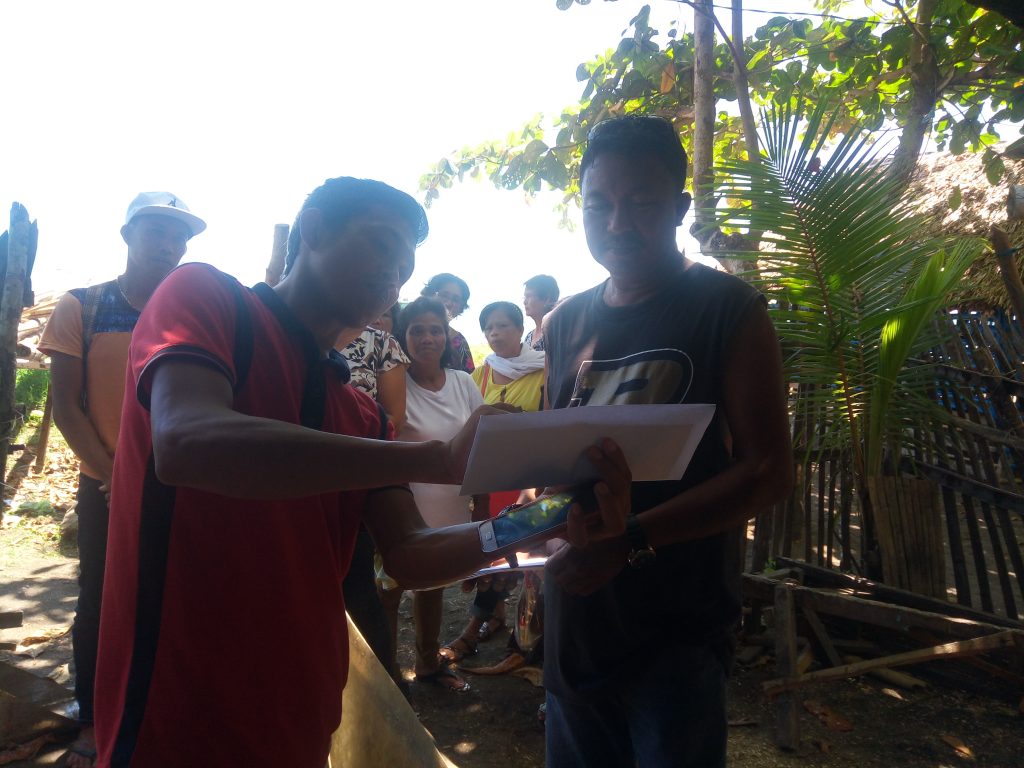 The procurement units of the PRDP South Luzon Project Support Office and PRDP-Bicol train the proponent groups on how to serve canvass forms to prospective suppliers. (Photo by Annielyn L. Baleza, DA-PRDP RPCO V InfoACE Unit)
The procurement units of the PRDP South Luzon Project Support Office and PRDP-Bicol train the proponent groups on how to serve canvass forms to prospective suppliers. (Photo by Annielyn L. Baleza, DA-PRDP RPCO V InfoACE Unit) Calamity-stricken communities in Sorsogon participate in PRDP procurement training
Can normal citizens handle a large amount of government fund? Do they have the ability to use it without the risk of corruption? While others doubt, the Philippine Rural Development Project (PRDP) believed.
To establish its confidence that common people like project beneficiaries can manage government funds, the Project’s procurement team led by the PRDP South Luzon Project Support Office (PSO) conducted the Training on Community Participation (CP) in LGU and Proponent Group Procurement Committee on April 10–12 in Sorsogon City.
Five proponent groups with approved PRDP microenterprise subprojects in the province’s calamity-stricken areas were oriented about the process of implementing the PRDP’s CP and Community Force Account (CFA) modes of procurement. The said groups are the Rural Improvement Club of Bagacay in Gubat, Samahang Mangingisda ng Tomalaytay in Castilla, Carayat Seaweed Farmers Association in Prieto Diaz, Cogon Fisherfolk Organization in Castilla, and the Samahan ng Mangingisda ng Gimaloto in Sorsogon City.
The PRDP will provide 10 units of non-motorized fiberglass boats and 25 tons of seaweed propagules to each proponent group through the CFA mode of procurement. With CP and CFA, the proponent groups are authorized to source out or procure works and goods contracts worth USD50,000 or below from the organization or its members. This is for the construction of small support infrastructures or provision of needed services. The practice of these modes of procurement should be in accordance with the Enterprise Investment Agreement and consistent with the Enterprise Subproject Procurement Plan.
Each proponent group is required to organize a procurement committee composed of a chairperson and two members. The said committee or group of canvassers is tasked to solicit quotations from at least three suppliers, evaluate submitted quotations, and prepare the abstract of quotations, and subsequently, facilitate the awarding of purchase order to the winning supplier.
According to PRDP South Luzon PSO Procurement Unit Head Michael Gregory Vargas, the CP and CFA training will capacitate the proponent groups in adopting the PRDP procurement methods in their own organizations’ procurement process. He added that it will also fast track the release of PRDP interventions to its intended beneficiaries. During the activity, the groups’ procurement committee members were familiarized with the process of canvassing for their non-motorized fiberglass boats.

PRDP South Luzon Project Support Office Procurement Unit Head Michael Gregory Vargas discusses the steps in the application of the Community Force Account mode of procurement. (Photo by Annielyn L. Baleza, DA-PRDP RPCO V InfoACE Unit)
“The CFA is a great mode para mas mapabilis natin ’yong intervention na kailangan nating ibigay doon sa mga proponent groups na talagang target ng ating Project (to fast track the interventions that we need to provide to the proponent groups who are the Project’s target beneficiaries). At the same time, we’re not only capacitating and educating the LGUs to do procurement, but the grassroots as well. We train them so that eventually, sa sarili nilang organisasyon ay i-apply nila (they can adopt our process in their respective organizations), Vargas said.
He added that through PRDP’s procurement system, people would see the black-and-white, the relevant documents such as purchase requests, solicitation, and abstract of bid, making the process transparent.
Vargas also hopes that when the groups adopt the process that PRDP shared, they will be able to resolve internal issues that may occur.

The procurement units of the PRDP South Luzon Project Support Office and PRDP-Bicol train the proponent groups on how to serve canvass forms to prospective suppliers. (Photo by Annielyn L. Baleza, DA-PRDP RPCO V InfoACE Unit)
According to Yolanda de Leon, President of the Rural Improvement Club of Bagacay in Gubat they are guaranteed that their group will get the fiberglass boats of best quality through the CP and CFA modes of procurement.
Meanwhile, Candelaria Esplana, President of the Carayat Seaweed Farmers Association in Prieto Diaz said that by adopting the CP and CFA, their organization will promote the concept of transparency.
“Namulat ako na huwag lang basta-bastang gumawa ng transaksyon na hindi recorded para transparent sa lahat. Mas walang pagdududa kasi documented (I realized that transactions should be properly documented to promote transparency. It is more credible, because it is documented),” she added.
Through the CP and CFA modes of procurement, the proponent groups are required to use geotagged photos in all procurement activities. Geotagging is one of PRDP’s innovative tools, wherein digital resources like photos, websites, and text messages are associated with a physical location to provide the precise location of subprojects.
“If this turn out to be good, we can replicate the PRDP model to other projects so that they can fast track the services needed by the farmers and fisherfolk—they can speed up projects and services following the PRDP model. We’ll do away with the very tedious procurement process,” Sorsogon Provincial Project Management and Implementation Unit (PPMIU) I-REAP Component Head Esteven Garcia said.
Vargas lauded the local government unit’s enthusiasm to help as well as the proponent groups’ enthusiasm to engage in the process. He underscored, however, that the proponent groups should strictly follow the process and provide the necessary documents required in the CFA procurement, otherwise, the entire process will suffer.

The procurement units of the PRDP South Luzon Project Support Office and PRDP-Bicol train the proponent groups on how to serve canvass forms to prospective suppliers. (Photo by Annielyn L. Baleza, DA-PRDP RPCO V InfoACE Unit)
Moreover, PRDP South Luzon PSO Associate Procurement Officer Clarinda Sarmiento stressed the value of close coordination and continuous capacity-building of the LGUs and proponent groups involved. She added that conducting pre-canvass before the actual procurement is one of the best practices that they may adopt.
The said training on the community participation in LGU and proponent group procurement is the first PRDP CFA training in the Bicol Region.
“We look forward to the proponent group’s issuance of purchase order and eventually to the delivery of their purchases,” Vargas added. ### (Annielyn L. Baleza, DA-PRDP RPCO V InfoACE Unit)
